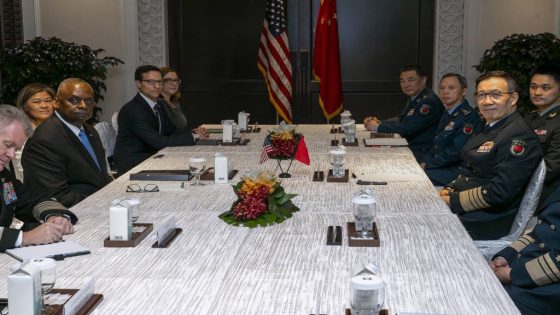SINGAPORE â U.S. Defense Secretary Lloyd Austin met with his Chinese counterpart for the first time, ending an almost 18-month break since the two countriesâ top defense officials last spoke in person.
According to a Pentagon readout of the meeting, Austin and Chinese Defense Minister Adm. Dong Jun discussed Chinese military activities around Taiwan, U.S. operations in the region, North Korea, and Chinaâs stance on Russiaâs war in Ukraine.
Senior U.S. defense officials, briefing reporters after the conversation, said Austin also discussed Chinaâs âstrategic capabilitiesâ in regard to space and cyberspace as well as nuclear weapons. In the last several years, Beijing has grown its nuclear arsenal, more than doubling the number of warheads since the start of the decade, according to the Pentagonâs analysis.
Top American officials have been warning China for months that continued support for Russiaâs defense industry â one of the main reasons Moscow has been able to quickly reconstitute its military â is unacceptable to Washington.
That message appeared again in this meeting, one of the American officials said.
âHe [Austin] said quite clearly that if Chinaâs support for Russiaâs defense sector continues, then the United States with our allies will have to take further measures,â according to the official, who didnât explain what those consequences would be.
Austin and Dong spoke on the sidelines of the Shangri-La Dialogue, a defense summit in Singapore that draws officials from across Asia. Austin has attended the event each year in his current role â except for a yearlong pause during the coronavirus pandemic â while the U.S. tries to work with more countries in the region, and do so more closely.
The Pentagonâs approach to the Indo-Pacific under the Biden administration has been defined by this kind of team building. The department has expanded defense agreements with Australia, the Philippines, Papua New Guinea and India, among other nations. It has also been able to convince existing allies, in particular Japan and South Korea, to improve their cooperation.
Chinaâs military activities in the region are partly driving these efforts.
China has repeatedly harassed Philippine vessels trying to resupply an outpost on the Second Thomas Shoal â a reef in the South China Sea that China claims ownership over, despite a 2016 United Nations ruling stating otherwise. China and the Philippines are among several nations asserting sovereignty over local geographic features.
China has also grown more aggressive around Taiwan, running a large military exercise around the island weeks before the conference here. Chinaâs government considers Taiwan a rogue province and has threatened to take it back by force.
Until late last year, Chinaâs military was conducting what the Pentagon called a series of âunsafe and unprofessionalâ intercepts of U.S. and allied forces. That stopped late last year after President Joe Biden and Chinese leader Xi Jinping met in California.
Will Austinâs meeting make a difference?
Austinâs meeting with Dong is meant to help improve what some in the region consider an overly tense relationship. Beijing severed military communication with the United States after then-House Speaker Nancy Pelosi, D-Calif., visited Taiwan in 2022. Since Biden and Xi spoke, the two countries have restarted such talks.
Austin and Dong spoke over the phone in April â the first time they talked. Dong is Chinaâs third defense minister in as many years amid a purge of top military officials due to corruption in the Peopleâs Liberation Army.
Last year at the same conference, Chinaâs former defense minister declined an offer to meet with Austin, leading to a short handshake between the two. Even though communications have restarted, the lack of agreement between America and China overall often leaves little to talk about.
âI expect that very little will come out of it,â Bonnie Glaser, an expert on Sino-U.S. relations at the German Marshall Fund, said of the Austin-Dong summit. âI think it will be an exchange of talking points.â
Still, Glaser noted itâs good the two sides are engaging each other, a point echoed by the American officials traveling with Austin.
Per the readout, Austin and Dong discussed restarting communication between their two countriesâ top military officers in the region â the head of U.S. Indo-Pacific Command and Chinaâs eastern and southern theater commanders.
The conversation also included mention of a Sino-U.S. âcrisis-communications working groupâ that would convene by the end of the year.
A separate issue is candor, a second American official said, referencing Chinaâs space, nuclear and cyber capabilities.
âItâs continuously been a challenge to engage on those issues,â the official noted.
Both Austin and Dong will speak at the conference over the weekend, a symbol of the relationship defining Indo-Pacific security. The International Institute for Strategic Studies, the think tank that hosts the Shangri-La Dialogue, released its annual report on the region ahead of the event. In it, experts warned of a âdraining decadeâ marked by competition between the two superpowers that is spilling out beyond issues of security.
To that end, conversations only have so much value, the first American official noted. China âremains the Department of Defenseâs pacing challenge, and no meeting will change that.â
Noah Robertson is the Pentagon reporter at Defense News. He previously covered national security for the Christian Science Monitor. He holds a bachelorâs degree in English and government from the College of William & Mary in his hometown of Williamsburg, Virginia.
Source Agencies



